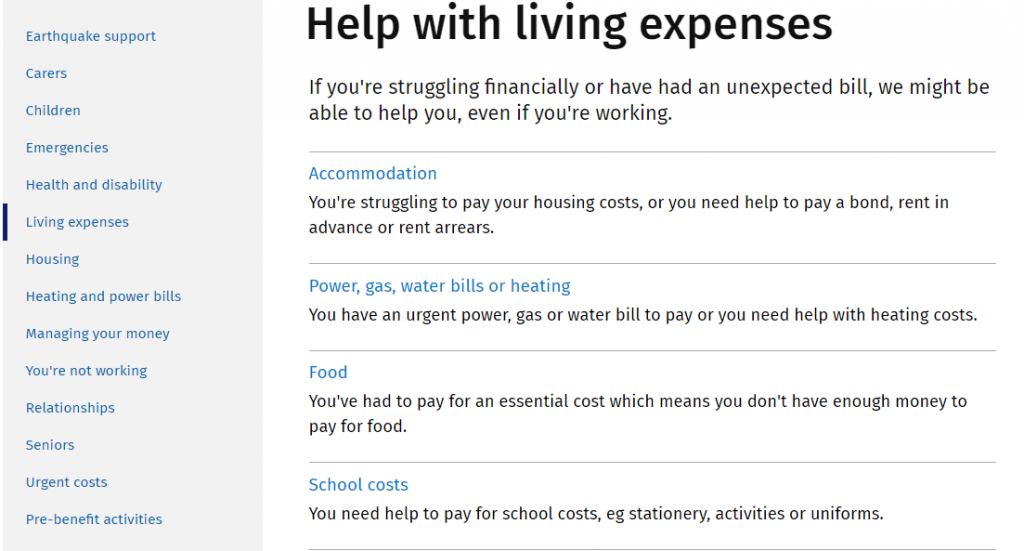This week, I moved house. I wrote a bit about what it means to try and relocate when you’re disabled or chronically ill. I wanted to expand on some of the things I mentioned about how WINZ might be able to help.
Obviously, this is by no means a guarantee that you’ll get any support from them. We all know how fickle and difficult they can be to deal with. I just thought I’d write down a few of the things they have helped or re helping me with.
I’m extremely lucky to have a very supportive case manager. I emailed her as soon as I knew I was  moving, and outlined how my costs would be changing, as well as what I needed to buy – ie whiteware.
moving, and outlined how my costs would be changing, as well as what I needed to buy – ie whiteware.
If you can, it’s best to set up an appointment so a case manager can guide you through everything. They might be able to let you know about entitlements you weren’t aware of, and sometimes they can fast-track things for you. It’s much quicker and easier than trying to do everything online.
Ahead of time
– Having said that, before you move, do have a look around the WINZ website. We all know that case managers don’t necessarily tell you if there’s extra help you might be eligible for, so going with that knowledge is a good idea.
– Do a budget for yourself. Have a look at your ongoing costs – rent/board, power, internet, groceries – and see if anything is changing. Measure that against your income so you have a good idea of where any shortfalls are.
– You don’t neccessarily need to be on a benefit to qualify for some of this help. If your income is below the threshold, WINZ can still offer a few different things.
The appointment
– Make sure you bring proof of your move, new address, and tenancy agreement if applicable. If any document seems vaguely relevant, bring it. It’s better to have it and not need it, than to have to rebook because you don’t have one bit of paper.
– Take someone with you. If you’re comfortable with doing so, having someone with you can help a lot. You can go through what you want to cover with them beforehand, and they can support you or remind you of things if they need to. They don’t need to be a full-on advocate and speak for you, but another set of ears can be helpful.
– Let your case manager know that you have looked at your budget, that you are doing your best to keep your costs down, but you are aware that there’s some areas where they can help. This lets them know you’re proactive and cooperative, and that you do know what your entitlements are.
Getting support
Please note, these are just some examples, based on what’s been relevant for me, and not an exhaustive list of what you might be able to access.
– Accommodation supplement: WINZ may put money towards your rent or board. The amount you get depends on your costs and your region – it probably won’t cover your whole rent. You can get this even if you’re not on a benefit.
– Bond: WINZ may be able to help you pay your bond. I’m not sure exactly how this works because I didn’t access it, but they won’t pay you back if you pay it yourself, they’ll only pay it direct. You can get this even if you’re not on a benefit.
– Temporary Additional Support: This is a weekly payment (I think it’s up to about $60) that can help if your benefit or income isn’t quite covering your costs. It’s only for a set amount of time, as the name says, but you can reapply when it runs out. It might come in handy to cover you when your budget has been used up by relocation costs.
– Whiteware loan: WINZ may give you a loan for a fridge/freezer and/or a washing machine. Because they get them wholesale through a preferred supplier, they’re cheaper than usual, but you don’t have much of a choice about what model you get. This is a loan and has to be paid back, (it’s automatically taken out of your benefit if you get one) but it’s at a pretty low rate and it’s interest free.
– Food grant: You don’t have to be on a benefit to qualify for this, and you don’t have to pay it back. You can get up to $200 every six months, so it’s not heaps, but again, it might help if you’re struggling because of the move and you need groceries.
In terms of what other help you might qualify for, you can look at living expenses, urgent costs, and health and disability.
Some examples:

